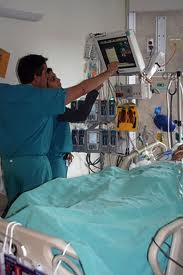May 24th, 2013
The MICU Rotation — Oh, no!
Jonathan Schwartz
 After a well-received post last week that focused on a commonly asked question I have fielded this year, I thought another common question would make for an excellent topic this week. We’ll focus on the MICU rotation from the resident (and, potentially, the medical student) perspective.
After a well-received post last week that focused on a commonly asked question I have fielded this year, I thought another common question would make for an excellent topic this week. We’ll focus on the MICU rotation from the resident (and, potentially, the medical student) perspective.
The MICU can be one of, if not the most, daunting rotations of residency. However, I believe that many students, interns, and residents would agree with this statement: “After I completed that rotation, it ended up being one of the best months in my entire residency.” I say this from a learning perspective, but the MICU rotation can also be a confidence boost. Realizing you can save simultaneous “crashing” patients with entirely separate disease processes can be quite rewarding – even in the unfortunate situations with poor clinical outcomes.
I am of the opinion that the worst part of the MICU rotation is dealing with the unexpected. Not knowing how many admissions will be called during your shift, the uncertainty of just how sick these patients will be, and the insecurities you might have about your own clinical knowledge and/or skills can make for quite an intimidating call day – and potentially an intimidating month.
What can we do to calm these fears? Good solutions are hard to come by (aside from simply diving in head first, and proving to yourself that you are capable). However, before starting your rotation, reviewing a few clinical concepts and manuscripts will likely pay great dividends. Additionally, I have a few pieces of advice that will also make for a much smoother, enjoyable experience in the MICU.
I had a few discussions with my colleagues to identify some of the most important manuscripts to review while working in the intensive care unit. This list is by no means exhaustive, but it serves as a good starting point and a reasonable inventory to at least briefly reconsider (or sometimes consider for the first time, if this is your first ICU experience!) before starting your rotation. With that caveat, here is my list of 7 landmark articles:
- Sepsis – Early Goal Directed Therapy (or read the Journal Watch summary for a capsule view of this landmark paper)
- Therpeutic hypothermia after cardiac arrest and Treating Comatose Survivors of Cardiac Arrest (read the Journal Watch summary)
- Transfusions in the ICU – TRICC trial (read the Journal Watch summary)
- Respiratory failure – ARDSnet and low tidal volume ventilation
- Corticosteroids in septic shock – CORTICUS (read the Journal Watch summary) and a French corticosteroid trial (read the Journal Watch summary)
- Fluid management – FACTT (read the Journal Watch summary)
- Blood glucose control and insulin therapy in the critically ill – NICE-SUGAR trial (read the Journal Watch summary)
Obviously many other topics and manuscripts are as important as those I’ve listed above. But, I’ve found these are very commonly referenced papers, and they’ll serve as an excellent starting point for keeping the doubts and apprehension at bay in the days leading up to the start of your MICU rotation.
How about a few general tips for the MICU month?
- Decipher the schedule and plan for fun activities to do on your days off. You’ll likely be working very hard while at work; recharging while away from the hospital is vital. Also, plan ahead to prevent any scheduling surprises mid-month.
- Do not hesitate to seek help when you are starting to feel uncomfortable. Almost certainly, you will have multiple resources for help if you need it — a co-intern or resident, the patient’s nurse, the pulmonology/critical care fellow, your attending, a pharmacist… You simply have to ask for help!
- Focus on details. You might be able to skip over some pieces of data, vital signs, parts of the physical exam, and other aspects when you are on other rotations, but this practice is both dangerous and sloppy when you are caring for critically ill patients.
Finally, enjoy yourself! Even if you hate critical care, smiling and making the best of a potentially bad situation will take you quite far. Who knows, maybe you’ll even find a new interest you never realized you had — only because you never gave it a chance!
I would love to hear your own ideas on important papers, topics, and general tips for the MICU. Post a comment below!

